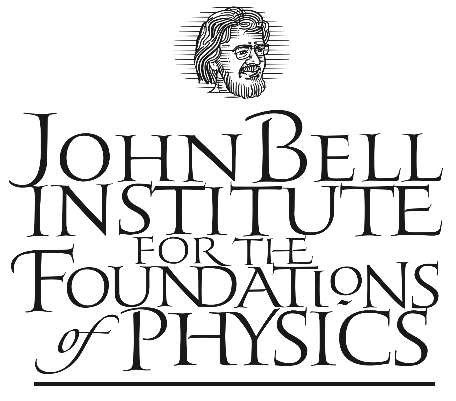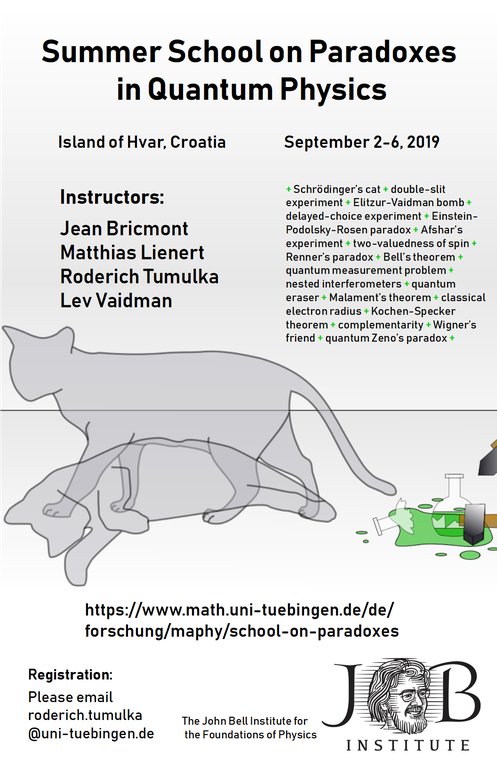School on Paradoxes in Quantum Physics

This summer school focuses on understanding the paradoxes of quantum physics. It comprises 4 days of intensive course with ample room for discussion, guided by a group of experienced instructors who are active researchers in the field of foundations of quantum mechanics. In a quiet environment on the Croatian island Hvar, students and instructors can focus on reaching genuine understanding of the puzzling features of quantum mechanics.
Time table (Note: The order of the lectures was changed later.)
Dates: Arrival Sunday September 1, 2019; departure Friday September 6, 2019
Instructors: Jean Bricmont (Louvain), Matthias Lienert (Tübingen), Roderich Tumulka (Tübingen), Lev Vaidman (Tel Aviv)
Intended participants: Primarily Master students, doctoral students, and post-docs in physics or related fields
Number of participants: 32
Prerequisites: Basic knowledge of quantum mechanics.
Location: Town of Bojanic Bad, island of Hvar, Croatia
Participation fee: Euro 450,00 (includes accommodation but not meals and not travel to Hvar)
Registration is now closed.
Short description of the content: Sometimes, a paradox is a sign that one of our assumptions was wrong. Other times, a paradox really means that some facts are counter-intuitive, and we just need to get used to them. But often people disagree about whether a paradox is of the get-used-to sort. The aims of our summer school are to analyze various paradoxes of quantum physics; to get to their bottom; to figure out what they imply for our understanding of quantum theory; to compare them to other known paradoxes from set theory (such as Russell’s and Banach-Tarski’s paradox) and from relativity (such as the twin paradox); in short, to find out what to think of them. In the course of doing that, we will get to know and to discuss various interpretations of quantum mechanics, such as Copenhagen, spontaneous collapse, many worlds, and Bohmian mechanics.
Topics will include many of the following: + Schrödinger’s cat + double-slit experiment + Elitzur-Vaidman bomb + delayed-choice experiment + Einstein-Podolsky-Rosen paradox + Afshar’s experiment + two-valuedness of spin + Renner’s paradox + Bell’s theorem + quantum measurement problem + nested interferometers + quantum eraser + Malament’s theorem + classical electron radius + Kochen-Specker theorem + complementarity + Wigner’s friend + quantum Zeno’s paradox +
Slides of lectures:
- Lecture 1: Introduction (by Roderich Tumulka)
- Lecture 2: The quantum measurement problem (by Matthias Lienert)
- Lecture 3: Many worlds (by Lev Vaidman)
- Lecture 4: Collapse theories (by Roderich Tumulka)
- Lecture 5: Bohmian mechanics (by Jean Bricmont)
- Lecture 6: The two-state vector formalism (by Lev Vaidman)
- Lecture 7: Spin and the Stern-Gerlach experiment (by Matthias Lienert)
- Lecture 8: The two-way experiment (by Jean Bricmont)
- Lecture 9: EPR and non-locality (by Jean Bricmont)
- Lecture 10: The past of a quantum particle (by Lev Vaidman)
- Lecture 11: No-hidden-variables theorems (by Jean Bricmont)
- Lecture 12: The Aharonov-Bohm effect (by Lev Vaidman)
- Lecture 13: Relativistic quantum mechanics (by Matthias Lienert)
- Lecture 14: The quantum Zeno paradox (by Roderich Tumulka)
Video recordings of the lectures:
Further material:
- Problems for the exercise sessions
- Poster: Quantum violation of the pigeonhole principle by Gregory Reznik, Shrobona Bagchi, and Lev Vaidman
- Video on the Escherian stairwell by Michael Lacanilao, filmmaker and fellow of the John Bell Institute
- J. Bricmont: The de Broglie-Bohm theory as a rational completion of quantum mechanics (2016)
The John Bell Institute is a recently founded organization for the advancement of knowledge on foundational questions of physics. It is named after the discoverer of the nonlocality theorem that involves the Bell inequality.

Last update: September 23, 2019
